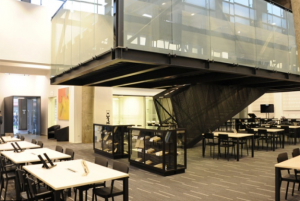In Chile the first institutional library has been created for the Military Academy, currently the Military School of Chile. At inception it had a small bibliographic collection that was intended to provide material for apprentice and specialist teachers and military cadets. As described in the book Nuestro Patrimonio Histórico Militar Un Tesoro de Todos Los Chilenos (Our Military Historical Heritage: A Treasure of All Chileans. Conservation and Dissemination of Historical and Military Heritage, 2013):
“In the memory of Guerra of the year 1850, the minister Pedro Nolasco Vidal gave an account to the Congress of the texts that were used to support the teaching of the different branches, among others: that of Fleuri for ancient history; Francoeur for spherical trigonometry; Beauchemin for the French language; that of Andrés Bello for Castilian grammar and that of Liscar and Francoeur for the teaching of cosmography applied to navigation and uranography.”
The collection’s development was carried out through donations from the members of the army; material was also requested from Spain, specifically concerning the artillery, such as treaties on weaponry for engineers. In 1870 the library kept 750 scientific and literary volumes.
At that time the topics addressed by military academic libraries were the following: architecture and construction, astronomy, defense, security, mathematics, physics and natural sciences, literature and languages, military art, geography, dictionary and encyclopedias, law, yearbooks, magazines and newspapers, infantry, cavalry and history.
The Military School Library meets the basic requirements of academic libraries but due to its combined military and academic nature it has to include specific resources. As a result, it keeps unique collections reflecting the history of Chile in Military areas. The access to the Library is open to the general academic world.
In 1885, the bibliographic collection was extended to all army barracks, according to the Minister of War at the time. As a result, a corpus of reference collections was spread throughout the country in every battalion and regiments. This corpus of 200 books initially has been increased overtime.
During the twentieth century the Library of the General Staff of the Chilean Army was created, which later became the Central Library of the Army when it was merged with the War Academy in 1976. Here again, library services remained open to the general academic public, who need to use its special collections.
Currently the School of the Military Library includes a Direction of Libraries, various teams of Librarians and digital and face-to-face services for its internal and external users. Its bibliographic collection amounts to more than 100,000 volumes, some of them of great heritage value, such as the works of different themes and Valuable Heritage, such as the History of Florida by Inca Garcilazo de la Vega, published in Madrid in 1722, or the epic poem Canto General by Pablo Neruda published in 1950.
Currently all military schools and regiments have their own bibliographic collections, including the Center for Military Studies and Research of the Chilean Army, which collection of approximately 6,000 volumes and special resources includes notably security and defense matters. In addition, the Military Geographical Institute can be noted which collections include Chilean planimetry, the first version of the cartographic survey made by the Frenchman Amadeo Pissis (Pierre Joseph Aimé Pissis, 1812-1889) from the 1850s and printed in 1875, an important input for Chilean commanders during the War of the Pacific between Chile and Peru against Bolivia (1879-1884).
References :
– Cuaderno de Historia Militar Na1 (Departamento de Historia Ejército de Chile ed., Vol. 1). (2005). Ejército de Chile
-Chrysostom M. Ximena. Evolución Histórica de la Biblioteca de Escuela Militar. Santiago 2012. Unpublished research.
– Nuestro Patrimonio Histórico Militar Un Tesoro de Todos Los Chilenos Corporación Conservación y Difusión del Patrimonio Histórico y Militar, 2013.
Camila Muñoz Churruca
Librarian of the Center for Military Studies and Research of Chile
IFLA ARL Standing Committee 2017-2021

